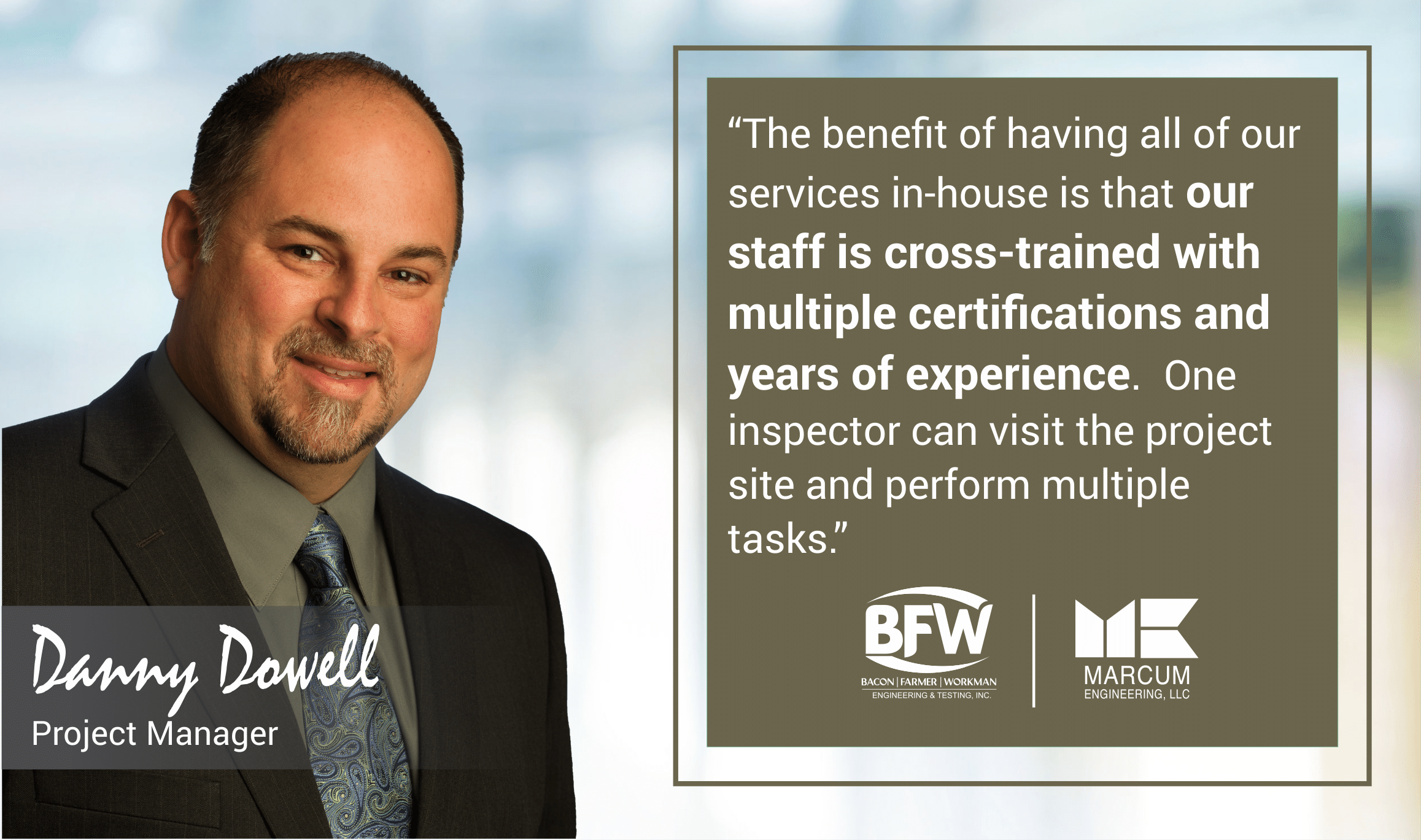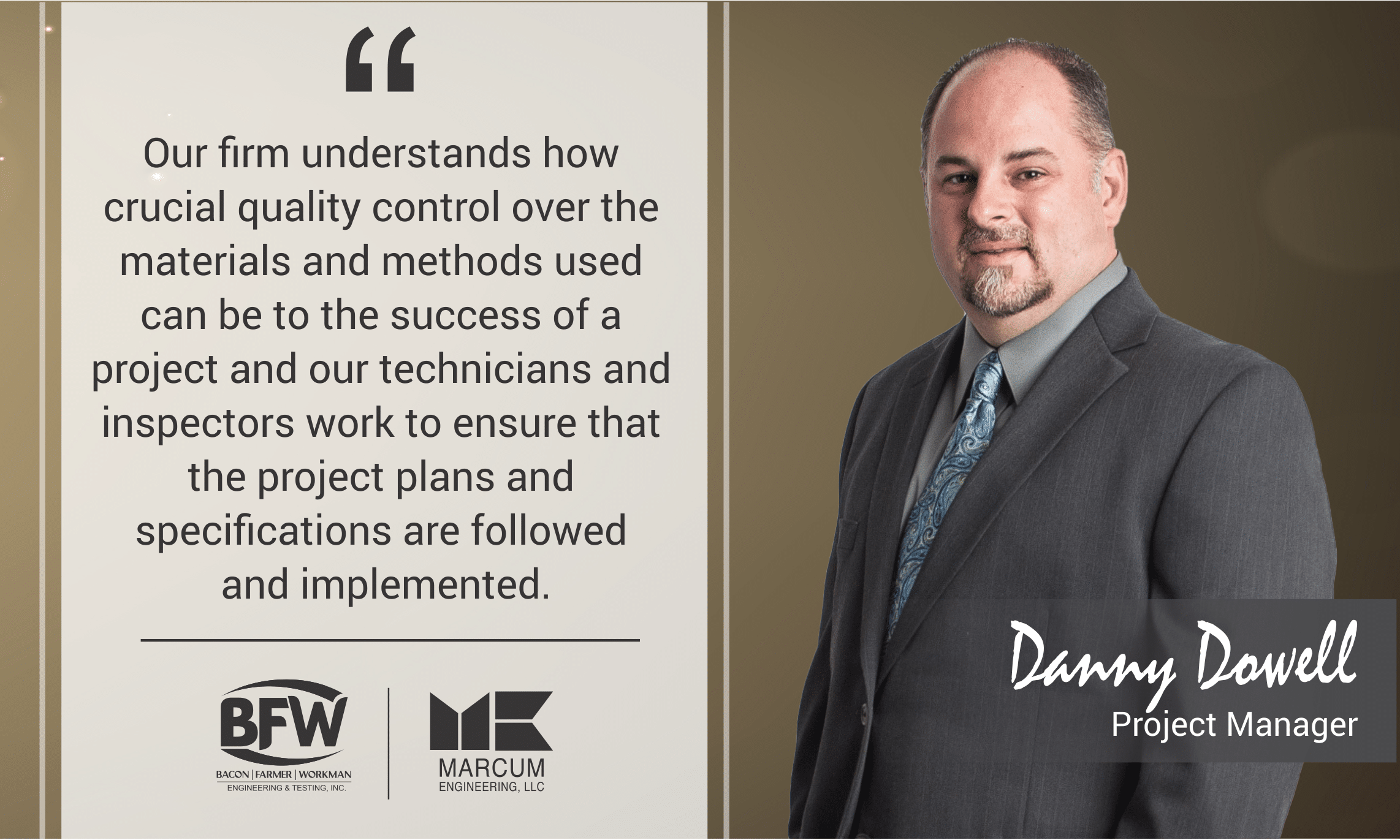Testing & Inspections: When You Cross the T and Dot the I
Testing and inspections is a service we offer that many other firms will subcontract. The expertise is a can of worms, so to speak; once you open it you better have the time (and budget) to truly tackle it. Luckily, we opened the can years ago, which means we have a knowledgeable testing and inspections department that ensures your project is done right from start to finish.
In-House Testing & Inspection is Thorough
We tapped Danny Dowell, Project Manager, to help us define our Testing and Inspections department. He’s a University of Missouri-Rolla Mechanical Engineering graduate and has worked with us for two decades. He’s also fond of his self-awarded Master’s degree in what he calls “scheduling and making things happen”.
Danny’s been doing this for a while. He understands both the challenge and value of building your own in-house testing and inspections team. After his decades of work at BFW/Marcum, he wouldn’t do it any other way.

“The benefit of having all of our services in-house is that our staff is cross-trained with multiple certifications and years of experience. One inspector can visit the project site and perform multiple tasks: thus minimizing site visits and assisting in saving the client’s money.
Not only do we provide Non-Destructive Testing (NDT) along with QA/QC Services; we also have an Army Corps of Engineers Validated and AASHTO/CCRL R-18 Accredited Laboratory. This provides the client with in-house soils/concrete/aggregate testing and data.”
He brings up a great point and something we’re particularly proud of. Keeping your knowledge in-house means that you naturally begin to cross-train. When your entire team can give impactful feedback across multiple areas you can’t help but be better and work together more meaningfully.
Seismic & Special Inspections Ensure Accuracy
“Seismic and Special Inspections” are detailed inspections of structural-related components constructed by the contractor using the approved contract drawings as a reference. A Special Inspector is a qualified person who has knowledge and expertise that will ensure that the constructed items conform to the drawings.
The Special Inspector is limited to interpreting the drawings and is testing and inspecting only those items specified in the “Statement of Special Inspections”. Further, the Special Inspector provides detailed verification of the quality, quantity, and placement of critical structural elements such as structural materials, fasteners, reinforcement, welds, and more.”
Having an in-house inspector means you have skin in the game at all times.
Non-Destructive Testing & Destructive Testing Provide On-Site Flexibility
Often, a project needs to be inspected for its structural integrity. Depending on the project, this could include non-destructive testing (NDT), destructive testing, or a combination of both. This process ensures that the installed building materials are up-to-par. Danny explains the difference between both methods of testing.
NDT requires an inspector to perform a visual inspection on-site, by comparing and measuring the installation and construction of components with the approved drawings. Destructive inspection is more invasive; actual samples are cut, cored, and/or removed from the site to be tested. This application tests for items such as defective concrete, sprayed fire-resistive materials, and/or steel that may fail at a later point regardless of how thorough the construction was performed.
Both methods are important ways of verifying the quality of your in-situ materials, which is often overlooked in favor of the quality of craftsmanship.
Quality Assurance & Quality Control Keeps Things Moving & On Target
Think about those two terms for a moment; quality assurance and quality control. They’re terms we say a lot without truly understanding their meaning. Often, we switch between the two without a second thought. However, they are two very different things and are both equally important to the success of a job. Quality assurance is a way of representing the best interests of your clients. Quality control is a way of assuring the best (and safest) methods are being used on-site. Danny expounds on this.
“Many reputable engineering firms realize that it is in their best interest, as well as the owner’s, to have a larger presence at the construction site. Our firm understands how crucial quality control over the materials and methods used can be to the success of a project and our technicians and inspectors work to ensure that the project plans and specifications are followed and implemented.”
Together, QA and QC are two avenues that ultimately converge at an endpoint, which is not just success but informed success.

Our Projects are Installed as Intended & Built to Code
Testing and inspections in the engineering industry is also about satisfying building codes and standards. There is no honor system in this field. Instead, you better have a thorough understanding of what you can, cannot, and required to do to build to code. That is where the testing and inspections department focuses much of its energy, which Danny explains.
“Many states incorporate the International Building Code (IBC) into their state-specific codes. This dictates that for many buildings special seismic inspections are required. In most states, a final report of special inspections must be completed prior to the “Certificate of Occupancy” being issued by the building enforcement department.
BFW/Marcum can accomplish this through the use of site visits, visual inspections, materials testing (i.e. concrete strength testing, soil density, etc.), and other non-destructive testing methods. Our trained personnel will be the key to ensuring that you are getting quality structural installation as intended by the project design team.”
Our Integrity
Our integrity is our most forward-facing asset, and it brings us the hard-won success we’ve found over the years as an engineering and design firm. We understand how crucial quality control over the materials and methods used can be to the success of a project. By partnering with you, the client, and the design team; our technicians and inspectors work to ensure that the project plans, specifications and required codes are followed and implemented.

Recent Comments